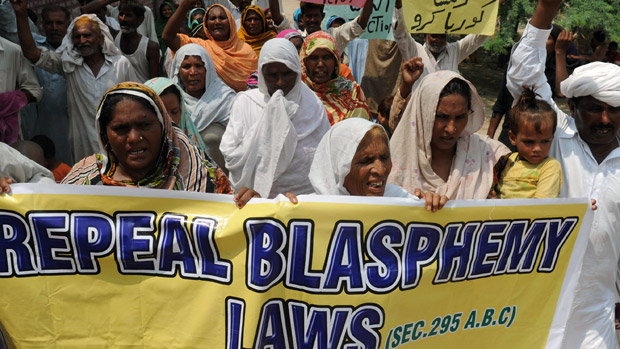Pakistani 'disco mullah' faces prosecution for blasphemy
Pop singer turned Islamic preacher apologised immediately but legal proceedings will go ahead

A free daily email with the biggest news stories of the day – and the best features from TheWeek.com
You are now subscribed
Your newsletter sign-up was successful
Police in Pakistan are investigating a former pop singer turned Islamic preacher, after he made some remarks allegedly insulting the youngest wife of the Prophet Muhammad.
The remarks appeared in a short video which went viral on the internet.
In the video, Junaid Jamshed, who quit music to become a member of the conservative Tableeghi Jamaat organisation in 2001, said the Prophet’s youngest wife Ayesha demanded attention and also once faked illness, the BBC reported.
The Week
Escape your echo chamber. Get the facts behind the news, plus analysis from multiple perspectives.

Sign up for The Week's Free Newsletters
From our morning news briefing to a weekly Good News Newsletter, get the best of The Week delivered directly to your inbox.
From our morning news briefing to a weekly Good News Newsletter, get the best of The Week delivered directly to your inbox.
The blasphemy case was filed by another conservative group Sunni Tehrik.
The ‘Disco Mullah’, as the former pop star is known in some parts of Pakistan, immediately released another video apologising and asking for forgiveness.
"I confess to my mistake. I did not do it intentionally," he said. "With a clean heart I ask that Allah forgive me and I beg and beseech all Muslims to forgive me. This was not on purpose", he added.
The spokesman for the conservative group who filed the case against Junaid told the BBC that the former musician’s apology won’t affect the legal process, which will go ahead in spite of Jamshed’s apology.
A free daily email with the biggest news stories of the day – and the best features from TheWeek.com
Blasphemy allegations can lead to a death sentence in Muslim majority Pakistan but, according to Al-Jazeera, no one in Pakistan has yet been executed for the crime.
-
 Political cartoons for February 16
Political cartoons for February 16Cartoons Monday’s political cartoons include President's Day, a valentine from the Epstein files, and more
-
 Regent Hong Kong: a tranquil haven with a prime waterfront spot
Regent Hong Kong: a tranquil haven with a prime waterfront spotThe Week Recommends The trendy hotel recently underwent an extensive two-year revamp
-
 The problem with diagnosing profound autism
The problem with diagnosing profound autismThe Explainer Experts are reconsidering the idea of autism as a spectrum, which could impact diagnoses and policy making for the condition
-
 Epstein files topple law CEO, roil UK government
Epstein files topple law CEO, roil UK governmentSpeed Read Peter Mandelson, Britain’s former ambassador to the US, is caught up in the scandal
-
 Iran and US prepare to meet after skirmishes
Iran and US prepare to meet after skirmishesSpeed Read The incident comes amid heightened tensions in the Middle East
-
 Israel retrieves final hostage’s body from Gaza
Israel retrieves final hostage’s body from GazaSpeed Read The 24-year-old police officer was killed during the initial Hamas attack
-
 China’s Xi targets top general in growing purge
China’s Xi targets top general in growing purgeSpeed Read Zhang Youxia is being investigated over ‘grave violations’ of the law
-
 Panama and Canada are negotiating over a crucial copper mine
Panama and Canada are negotiating over a crucial copper mineIn the Spotlight Panama is set to make a final decision on the mine this summer
-
 Why Greenland’s natural resources are nearly impossible to mine
Why Greenland’s natural resources are nearly impossible to mineThe Explainer The country’s natural landscape makes the task extremely difficult
-
 Iran cuts internet as protests escalate
Iran cuts internet as protests escalateSpeed Reada Government buildings across the country have been set on fire
-
 US nabs ‘shadow’ tanker claimed by Russia
US nabs ‘shadow’ tanker claimed by RussiaSpeed Read The ship was one of two vessels seized by the US military